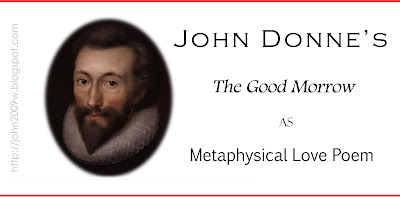The novelty of Donne's metaphysical poetry is marked more specifically in his love poems which are immensely popular. Of course, there are numerous English poets who have treated love with much intensity and impulsiveness, but there is seen hardly anyone to give love such an intellectual bias as Donne is found to have done. Intellectual vigour and depth, restraint and impetuosity, are found well combined in him as a characteristic feature of his dignified artistry.
Of Donne's love poems, The Good Morrow may be instanced as a typical one. His novelty as a metaphysical love poet is here exhibited /distinctly as elsewhere. The poem remains quite engrossing and entertaining, as a specific instance of metaphysical love poetry, combining and adjusting intellect and emotion in right proportions.
Of course, Donne's theme is here nothing new. It is the old story of love and devotion and the old pleading for unity in diversity in love. The poet addresses his ladylove, wonders to ascertain what they did before their love, feels confident of their oneness through love and asserts their constancy that nothing can 'slacken' or 'destroy'. But the entire theme of the poem is expressed in a highly singular and suggestive manner. The novelty of Donne's poetry, as also of metaphysical poetry in general, lies not in the matter but in the manner of expression. In this respect, The Good Morrow, like The Flea, The Anniversarie and The Sunne Rising, is a typical instance. The theme in each of the poems is the oneness of and devotion to love. What, however, counts most here is the way in which this oneness is shown by the poetic craft which is unconventional and essentially radical for the age to which Donne belonged.
Metaphysical poetry consists of conceits. In a conceit, two incongruous elements are compared with a profoundly intellectual penetration, causing thereby a mental stir. This is evident in Donne's comparison of two lovers to" two hemispheres', "Without sharp North, without declining West." The concluding words of the poem specifically convey a conceit. Love is so unified that none of the lovers can 'slacken' and 'none can die.'
"If our two loves be one, or, thou and IThe unification of the lovers is conveyed by means of a rare conceit of the flea in the poem The Flea. The little insect sucked the lover first and then sucks the lady and it mingles their 'two bloods'. The flea is the point of union of two lovers and the poet's assertion is quite novel—
Love so alike that none do slacken, none can die."
"This flea is you and I, and thisThe Anmversarie, another significant poem from Donne, illustrates equally the novelty of the metaphysical style in the treatment of love. The complacent mood of the lovers has a quite startling, rather epigrammatic expression—
Our marriage bed, and marriage temple is;"
"Only our love hath no decay;Metaphysical poetry, as asserted already, is essentially intellectual. Donne's love poetry is also essentially intellectual. This is revealed both in its reflective nature and in its play of wit. In The Good Morrow, metaphysical intellectualism is found triumphant, and the poem flashes both with reflectiveness and wit. The predominance of Donne's reflection is clearly expressed in his observation on the unity in diversity, attained through love. His theme is a simple and solid expression of and bears out his profound reflection on the true strength of devoted love.
This, no tomorrow hath, nor yesterday,
Running it never runs from us away,
But truly keeps his first, last, everlasting day."
The reflective element of the poem, however, is made particularly diverting by the play of wit. The poet's interrogation as to what the lovers did till they had loved indicates this clearly—
"I wonder by my troth, what thou and IAgain, his analogy of sea-discoverers and maps to express the devotion of love testifies to the range of his wit and the depth of his intellectualism.
Did, till we lov'd?"
Metaphysical poets are found logical and analytical rather than sensual and emotional. Their uniqueness lies much in the synthesis of divergent elements, the abstract and the concrete, the remote and the near, the sublime and the commonplace. This is a specific novelty of the metaphysical style and also of Donne's. His imagery to describe the devotion of love is conceived in a quite novel manner. The images of 'sea-discoverers' and 'maps' are well employed to assert love's constancy and oneness.
"Let sea discoverers to new worlds have gone,The poet's imagery is taken from unconventional elements. The conventional matter of love is demonstrated and emphasized through the unpoetical, rather materialistic and prosaic elements. This, however, forms the genesis of the metaphysical style and originality as also Donne's poetry.
Let Maps to others, worlds on worlds have showne,
Let us possess one world, each hath one, and is one."






Outstanding.
ReplyDelete